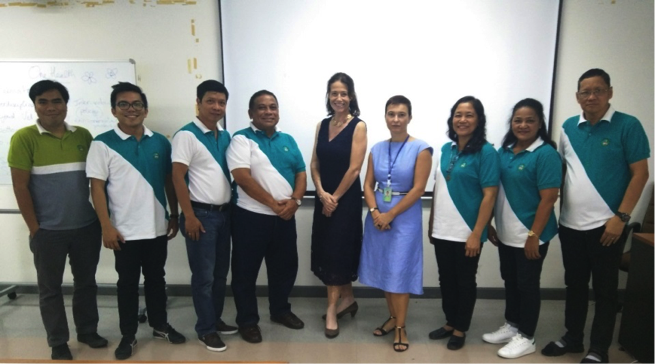
The School of Environmental Science and Management (SESAM) helped facilitate the learning visit of a Philippine delegation to Thailand last 27-31 March 2017. The team is composed of officials from DOST-Philippine Council for Agriculture, Aquatic, and Natural Resources Research and Development (PCAARRD), the Department of Agriculture Regional Office III, and the Provincial Veterinary Office of Pampanga, who are members of an ACIAR-PCAARRD project,“Improving the production and competitiveness of Australian and Philippine pig production through better health and disease control.” The event was designed to learn first-hand best practices and knowledge on smallholder swine operations implemented using EcoHealth. As an interdisciplinary approach, EcoHealth considers the linkages between ecosystems, society and health of animals and humans, and presupposes that human survival depends on health and diverse ecosystems.
Though relatively new, Eco-Health approach has been tested by a number of countries in Southeast Asia through various programs and initiatives. Noteworthy is the case of GREASE (http://www.grease-network.org), a regional network that listed SESAM-UPLB as an Associate Member since 2012. Organized by CIRAD, GREASE support research activities for a better management of emerging epidemic risks in Southeast Asia. It is an active network that responds to the challenge of emerging transboundary animal infections and zoonotic diseases by producing theoretical and operational approaches in the framework of the “One Health” approach. Specifically, members of the visiting team were able to differentiate the aspects and characteristics of EH and OH approaches thru the lectures delivered by Dr. Aurelie Binot and Dr. Flavie Goutard who were the coordinators for GREASE network.
The visit also included a tour at the Veterinary Teaching Hospital of the Faculty of Veterinary Medicine of Kasetsart University Bangkhen and Kamphaeng Saen Campuses and of Khon Kaen University with its state-of-the-art facilities. The team witnessed as well a small pig farm holder who practices integrated farming wherein fish, sugarcane and other crops are complementary grown aside from the backyard pigs.
The visit in Khon Kaen, Thailand also included a discussion on the success of the Lawa Lake Model using the EcoHealth/OneHealth approach presented by Prof. Banchob Sripa of Khon Kaen University. This highlighted the liver-fluke disease problem that the residents around the Lawa Lake, Chi Kok Kor Village had acquired by eating raw fish, which was solved through the implementation of EcoHealth approach combined with elaborate information, education, and communication (IEC) solutions.
With this EcoHealth learning visit, the Philippine team has established networks and contacts with specialists and practitioners of EcoHealth approach in Thailand for future knowledge exchange, collaboration and cooperation (Ryan Real and Glenn Oca).

